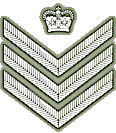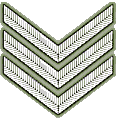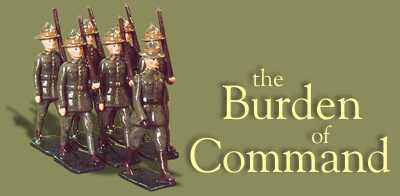|
Early in 1980 I was selected, along with about a dozen others from Bravo Company, to go on a course designed to train us for the glorious loneliness which is command. Those of us who were successful could expect to be elevated to the dizzying heights of lance-corporal, with the fate of thousands of men in the palms of our hands. Promotion at last! The power! I immediately started plotting how I was going to re-mould the New Zealand Army in my own image.
For those of you who are unfamiliar with the ranking system employed in the New Zealand Army, the following list will take you from the exalted heights of Sergeant Majory down to the ruck and swill of common soldiery:
- Sergeant Major
These come in a variety of styles, the biggest and most heavily-starched being the Regimental Sergeant Major. Each company (about 100 men) also has its own Company Sergeant Major. Collectively, they're known as Warrant Officers (Class 1 and 2 respectively), and are easily identifiable by the way they walk around with their chests thrust out like pigeons, the crackling of their heavily-starched uniforms, the blinding brightness of their obsessively-polished boots, and the extreme loudness and obscenity of their speech. They're also identifiable by badges they wear on their wrists; silver for W.O.2 and gold for W.O.1. Sergeants Major are invariably very "soldierly", in other words, paragons of the art of bullshit.
- Staff Sergeant

These guys hang in a sort of rank limbo, not quite Sar'majors but with more responsibility than Sergeants. Staff Sergeant is generally an administrative rank, and often they'll be used to fill the place of a Company Sergeant Major. Staff Sergeants are identified by three chevrons and a crown on their left arm.
- Sergeant

Sergeants are the most laid-back people in the whole army. They are also the most smug people in the whole army, because they know that they have achieved the ideal position - enough authority that they never need do any work ever again unless they feel like it, without enormous responsibilities. The only time they lose this smugness is when they have to take a bunch of mindless pimply recruits out for grenade training, when they actually have to stand around in a small concrete booth with a bunch of camoflaged morons and let them play with explosive devices.
Sergeants wear three chevrons on their left arm, and there is normally one sergeant per Platoon. Sergeants have their own Mess.
- Corporal

Corporals can be divided into two types: young and old. Young corporals tend to be very active, and still hold out some hopes of making sergeant some day. Old corporals have usually given up any hopes of promotion, and become almost as laid back as sergeants. Corporals wear two chevrons, and there is normally one per Section of 10 men.
- Lance Corporal

These creatures can also be divided into two types: fresh and stale. Fresh lance-jacks are generally a pain in the arse, since they fear (with very good reason, I might add) that other soldiers do not respect their authority as non-commisioned officers. They try to make up for this feeling of insecurity by making absurd demands on their soldiers, like obedience and ridiculous things like that. Eventually, in the face of the pig-faced obstinacy and sullenness which has been common to soldiers since the beginning of civilisation, they start to get Stale, and begin to relax.
Stale lance-jacks no longer fear that other soldiers do not respect their authority as non-commisioned officers. They know this to be true, and they can finally relax into the role and wait for further promotion.
Lance Corporals wear a single chevron.
- Private
These are the lowest of the low, and rest at the very end of a chain of command which passes demands for work down until they finally land on the private soldiers. Except for officer cadets, everyone in the army starts out as a private, and it is here that they learn that most officers are idiots, and that the best way to succeed in life is avoid attention. If you can't avoid attention, lie, and keep lying even in the face of overwhelming evidence. If it is apparent that a lie isn't going to work, act dumb. On these principles rest the towering and majestic edifice that is Military Life.
NOTE: There are also things called "officers" in the New Zealand army, but in common with the officers of other armies all over the world, they never do anything and have absolutely no effect on the day-to-day running of the military.
|

